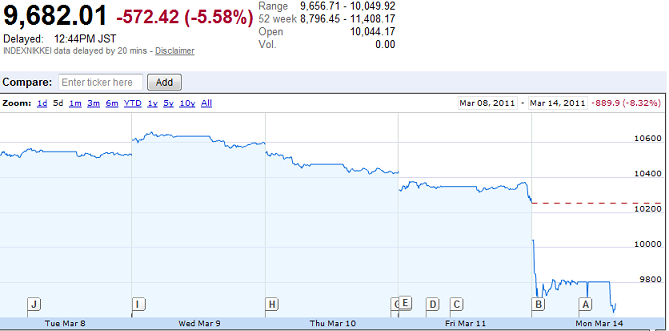Markets are reeling in Japan as the aftermath of the earthquake and tsunami sets in (see here to donate to the relief efforts). Rumors of a radioactive leak are only compounding fears. The Nikkei is down 5.5%, but has traded as low as 6% as the afternoon session begins.

The big question marks for the economy are still being resolved, but if markets are any measure it’s clear that the impact will be broad and tremendously negative. The world’s third largest economy was already at risk of entering an economic weak spot and this tragedy will certainly not help matters. For international investors the question marks are even greater. The WSJ hits on two of the key concerns:
“Are global supply chains so taut that a disruption in the world’s No. 3 economy will be felt around the world?
Japan’s factories play an outsize role in global production-churning out products and parts for other company’s goods, ranging from a fifth of the world’s semiconductors to large shares of the world’s most advanced machine tools and solar panels.
A wide range of industries, from car and steel plants to beer brewers and paper factories, shut down in the wake of the quake and tsunami. How long production is halted depends not just on the direct damage to those plants, but other factors—such as the availability of power needed to run operations. The result could be shortages of key components around the world, though excess industrial capacity in several big developed economies gives the world some manuevering room.
What will the earthquake do to global energy markets?
The major factor in oil markets, of course, is what happens next in the Middle East. Japan is the world’s No. 3 oil importer, after the U.S. and China; its troubles do nothing to global oil supply. Disruptions in production may limit Japan’s near-term demand for energy; oil prices fell in the immediate aftermath of the quake. Over time, though, the shut nuclear plants could lead Japan to increase imports of oil, natural gas and coal. Analysts estimated that replacing all of Japan’s nuclear capacity with oil would mean importing 375,000 more barrels a day, on top of the current demand of about 4.25 barrels.
The worst case scenario, though, centers on the nuclear plants—and the risk of a catastrophe with long-term effects on the people and the land surrounding the crippled plants.”
See here to donate to the Red Cross and help the Japanese recover from this horrible crisis.
Mr. Roche is the Founder and Chief Investment Officer of Discipline Funds.Discipline Funds is a low fee financial advisory firm with a focus on helping people be more disciplined with their finances.
He is also the author of Pragmatic Capitalism: What Every Investor Needs to Understand About Money and Finance, Understanding the Modern Monetary System and Understanding Modern Portfolio Construction.

Comments are closed.